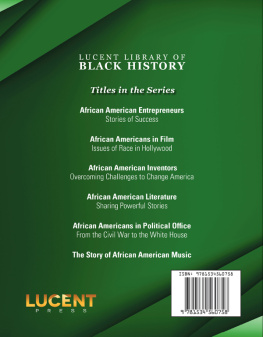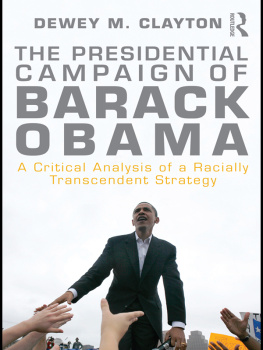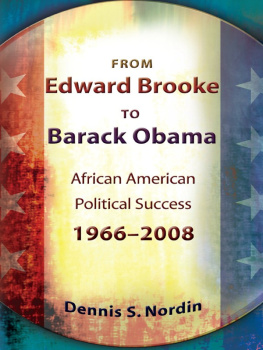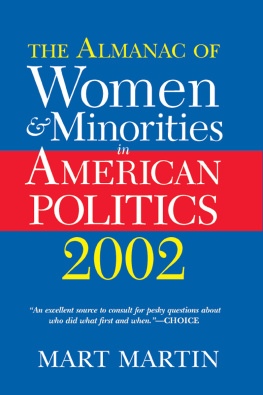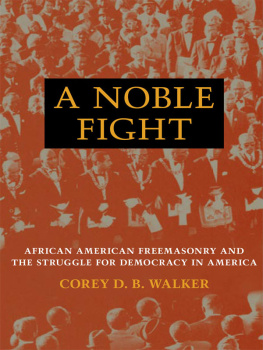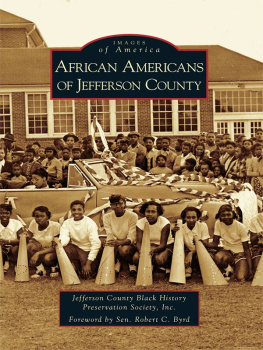ABOUT THE AUTHOR
During more than fifty years of public life, L. Douglas Wilder has been at the forefront of many historic moments. In 1969, he won election to the Virginia Senate from his hometown, Richmond, and in the process became the first African American elected to that body since the end of Reconstruction. While serving in the senate, he rose to the chairmanship of several powerful standing committees during sixteen years of service. By the time he began his 1985 campaign to become Virginias thirty-fifth lieutenant governor, Wilder was recognized as one of the commonwealths most powerful legislators. Many pundits predicted that Virginia was not ready to elect an African American statewide official in 1985, but Wilder set out on an extensive tour that took him to all one hundred and thirty counties and cities in the commonwealth. He won the election, becoming the highest elected African American official in the country at that time.
Four years later, he again set out on a tour of the commonwealth, this time as a candidate for governor of Virginia. Again, some pundits doubted that Virginians were ready to elect a grandson of slaves as their states chief executive. Again, voters of the commonwealth proved they were ready, choosing Wilder to serve as the sixty-sixth governor of Virginia.
During his term, Governor Wilder faced a severe budget crisis during a deep recession but managed repeatedly to balance the budget without raising taxes. Following Wilders years as governor, he became a respected political, social, and economic commentator in addition to teaching classes at Virginia Commonwealth University.
In the early 2000s, a broad array of Richmonders reached out to Wilder and asked him to help lead an effort to reform the governing structure of the city of Richmond. After residents voted overwhelmingly to change the charter and elect a strong mayor, Wilder was elected mayor in 2004.
When Wilder retired from the office of mayor in 2009, he returned to his role as a Distinguished Professor at the L. Douglas Wilder School of Government and Public Affairs at Virginia Commonwealth University while also serving as a national commentator on public affairs.
Wilder graduated from Virginia Union University in 1951 with a degree in chemistry. He earned his juris doctorate from the Howard University School of Law in 1959. He is the father of three children, Loren, Lynn, and Lawrence Douglas Jr., and resides in Richmond, Virginia.
Website: Wilder Visions. www.wildervisions.com
Follow Doug Wilder on Facebook and on Twitter: @GovernorWilder
ACKNOWLEDGMENTS
While I have always tried to make my own way, I have been very fortunate to have a number of people whose talents and input have helped shape me personally and professionally. It is my great pleasure to take this opportunity to recognize them.
First, this book would not have come together as successfully as it has without the support of my benevolent drillmaster Catherine Whitney, who cracked the whip increasing the specificity, timeliness, and order of the project and who lent her innumerable narrative gifts to this project; my agent Jane Dystel; my editor Eugene Brissie; my trusted advisers Cordel Faulk and J. Parker Gouchenor; and my research and administrative assistant Angelica Bega Hart. I am also grateful for the guidance of Dan Conley and to Glen Davidson for his participation and recommendations.
The great opportunity of writing a book such as this one is the chance to reflect on those who have made a significant impact on my life and helped me grow as a person. Early influencers include the many men at Dick and Percy Reids barbershop who encouraged me to argue and support my arguments in a community of men. Many educators, including all of my elementary teachers and most in high school, especially J. R. Ransome Jr., also made a significant impact on me as a young man. In college, Dr. Limas D. Wall; Dr. Lewis O. Jeffries, who taught chemistry; Dr. Wesley Stevens, who taught calculus; and Dr. John Malcolm Ellison, the first African American president of Virginia Union University, were catalysts in shaping my early professional interests. In the military, Major Earl C. Acuff, whom I acknowledge in the book, helped me believe in the possibility that promises of fairness and equality could be fulfilled and demonstrated unparalleled leadership and vision.
Numerous people were also influential in my legal career: Roland D. Ealey and Colston A. Lewis, who wrote the letters that helped secure my admission to Howard University; Spottswood W. Robinson, who asked Thurgood Marshall to appoint me as his successor as the NAACP Legal Defense and Education Fund Inc. representative; and Professor Herbert O. Reed of Howard University Law School. These men all had a significant impact on me. While I was in law school, I also had a friend, Lewin R. Manley Jr., who was in dental school. He has remained a longtime friend, and we have maintained an understanding of race in America and its portents.
Many people were instrumental during my political career: Paul Goldman, whose incisive mind and quick grasp of political issues were invaluable in my campaigns; Senate clerk J. Shropshire; Susan Clarke Schaar, former deputy and now clerk of the Virginia State Senate; William V. Rawlings, my desk mate in the Senate who hailed from Ivor; William B. Hopkins, a fellow Korean War veteran from Roanoke; and Peter K. Babalas, senator from Norfolk. All were amiable and instructive colleagues in my political career. I want to acknowledge the help and advice of Earl Davis, experienced representative of COPE. He also gave freely of his time to the development of the clout of the Crusade for Voters. To those in my administration as governor, too numerous to list here, I thank you all as well.
As you can tell from reading this book, a passionate and enduring goal of mine is the building of a National Slavery Museum. In that effort, Vonita Foster, Bill Cosby, Sandy Robinson, William P. Jones, Vincent C. Robinson, and Vinceretta T. Chiles have each endeavored alongside me in making this dream a reality. I also want to acknowledge Harry Watkins for his benefactions as well as those who maintain the Spirit of Freedom garden.
Ive always believed in the importance of education as a pathway to success; thus, Ive been grateful for the support of three wonderful Virginia universities. First, my alma mater, Virginia Union University, where a beautiful library facility was named in my honorthe first such building or facility so named and the first grantor of the many honorary degrees that I have received. At Virginia Union, President Claude O. Perkins; former board president Frank S. Royal; Rita Henderson, director of art acquisition, marketing, and development; and Selecia Gregory Allen, archivist in Special Collections, have all been tremendous assets. At Virginia Commonwealth University (VCU), where I currently lecture and where the School of Government and Public Affairs bears my name, President Michael Rao, Dean Niraj Verma, and former President Eugene Trani have been very supportive. Thanks also to the staff at VCUs Special Collections and Archives who allowed my research assistant to use their facilities in completing her duties. At Virginia State University, where I began my career in teaching, it is incumbent on me to thank Dr. Calvin M. Miller, former dean of the School of Humanities for his efforts. The support of individuals at all of these universities has been tremendous. I also want to acknowledge Howard Universitys School of Law for taking a chance on me (my grades were not the strongest suit in my application).
Friends and family have also paved the way for this book and so many other projects. Of course, my parents, siblings, and extended family have all played roles. So too have my children, Lynn, Larry, and Loren. It has been a profound joy to watch them grow into amazing adults and to see the promise in my grandsons, Dean and Wilder. I also must thank my friend and law partner Roger Gregory, whose wit and wisdom truly set him apart. In addition, I want to thank Dr. Robert Bob Holsworth, former director of the School of Government at VCU before it gained independence and the former chair of the Department of Political Science, for his continued support and friendship.


